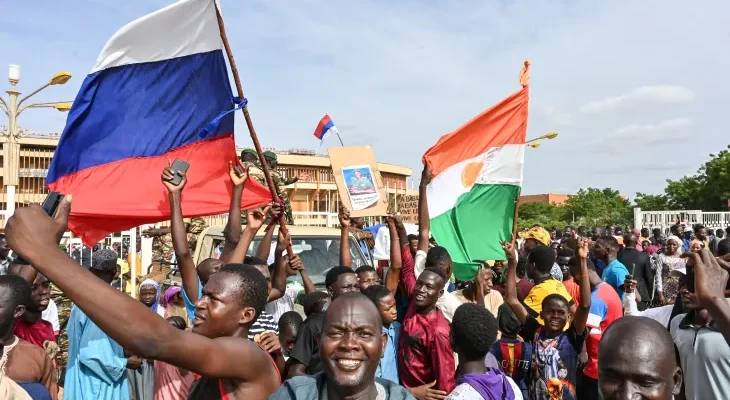
After a series of coups, one country after another is moving to expel the traces of former empires.
By Denis Rogatyuk, a Russian-Australian journalist and writer based in Latin America, international director of El Ciudadano media platform, one of Chile’s largest independent media sources.
Africa is the cradle of human civilisation and the planet’s richest continent in terms of natural resources. But according to Captain Ibrahim Traore, the president of Burkina Faso, younger generations cannot understand why, despite its riches, Africa continues to be the poorest.
Across the continent, we have seen uprisings and armed rebellions by anti-colonialist military leaders who have sought to reclaim their sovereignty from European imperialist powers, particularly France.
Guinea, Burkina Faso, Mali, and Niger are just some of the countries that make up the collective of former French colonies in West Africa. They have long served as the key source of natural resources for France and other European powers. Niger supplies 15% of the uranium needed for French nuclear reactors. Burkina Faso is a key exporter of gold, while Guinea is a crucial entry and exit point for trade between France and its former colonies. Mali is another major exporter of gold, and has been a battleground between the government and various armed Islamist groups.
The map of West Africa began to change radically in 2021. Like dominoes, pro-French regimes began to fall to military uprisings, starting with Mali in May 2021 and the coup led by Assimi Goita, who immediately demanded that the French military leave the country. The Central African Republic also expelled French troops in June 2021. This was followed by the military takeover in Guinea by Mamady Doumbouya, a former French legionnaire, in September 2021. One year later, Traore became the world’s youngest president after seizing power in Burkina Faso, and he proceeded to expel the French military in January 2023. Finally, the military rebellion in Niger on July 26 led by Abdourahamane Tchiani, now assuming the presidency, also expelled French forces and banned the export of uranium to France.
The case of Burkina Faso and Traore is particularly interesting. During his recent trip to St. Petersburg for the Russia-Africa summit, Traore gave a speech in which he called Russia part of the African family. He condemned the looting of the continent by European powers, and ended with the slogan “Homeland or death! We shall win!” – echoing the words of Ernesto Che Guevara and the national motto of Cuba. Many have compared Traore to Thomas Sankara, the revolutionary leader of Burkina Faso from 1983 to 1987, who was also called the “African Che Guevara.” Sankara likewise expelled French forces, nationalized the country’s resources, and implemented socialist policies of redistribution, before being assassinated in a pro-French coup.
So, what are France and its partners likely to do now? The United States and Britain have already cut all aid to Niger and its allies in response to their ban on exports of uranium to France. On July 30, the Economic Community of West African States (ECOWAS), a confederation that includes many of France’s former colonies, issued an ultimatum to Niger – Tchiani has one week to step down or a military intervention would begin with the backing of France. Nigeria, a key French ally in the region and the leader of ECOWAS, was chosen as the launchpad for a possible military intervention into Niger. However, the senate of Nigeria rejected the demand of the highly unpopular president, Bola Tinabu, to authorize military action against its neighbour. The ultimatum has since expired, and Niger proceeded to close its airspace to any commercial aircraft.
The presidents of Burkina Faso and Mali have responded that any military intervention in Niger will amount to a declaration of war against them. But the African states also have an ace up their sleeve – their long-time friendship with Russia. At the recent Africa-Russia summit in St. Petersburg, delegations from 49 African countries were in attendance. Russian President Vladimir Putin declared support for Africa’s battle against neo-colonialism, stating that Moscow had written off $23 billion in African debt and that more than 50,000 tons of grain will be delivered free of charge to the continent.
The friendship between the peoples of Africa and Russia stretches back to the 18th century. The story of Abram Gannibal, the African general in the service of the Russian Army and the great-grandfather of the legendary poet Alexander Pushkin, is among the most fascinating parts of the lore of Russian.
The story was first published by RT.














